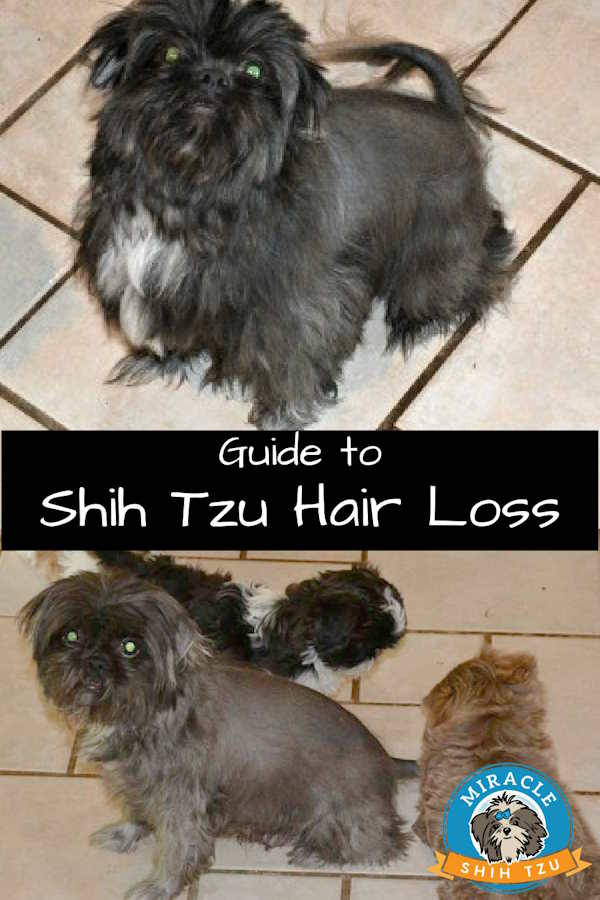Shih Tzu Hair Loss: Why is My Dog Loosing Hair
Shih Tzu Hair Loss by Janice, Published 03-09-2024
Shih Tzu owners love the personality, loyalty, and spunk of these little dogs, but they cannot overlook their regal appearance that sports a beautiful thick coat that’s soft to the touch and lovely to snuggle.
What happens when that luxurious coat fails to grow and slowly disappears?
You might be worried. I know I was when my sweet Lucy started to lose her hair. Thinning was one thing, but her coat was disappearing and all we saw was a bald dog. (Think Mexican Hairless). I was a little more than just worried; I was frantic to find out what had happened to her and hopefully restore her beautiful solid blue coat back to its former self.
In this article, I will tell her story and provide information about Shih Tzu hair loss for anyone experiencing the same thing.
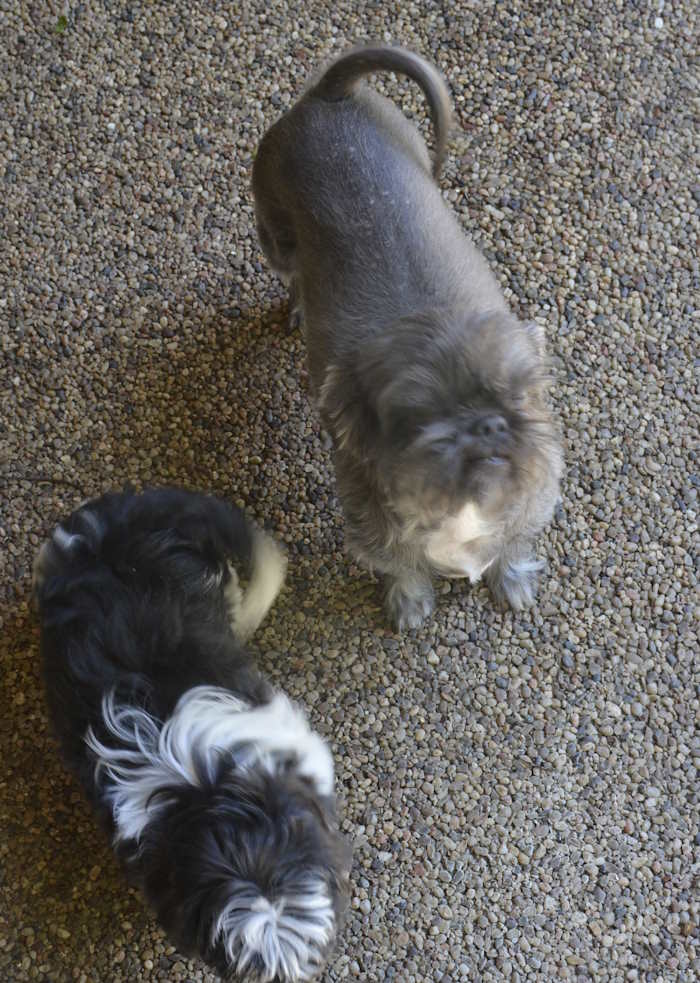 This is Lucy who has experienced hair loss over much of her body and tail with her 12 week old Breezy.
This is Lucy who has experienced hair loss over much of her body and tail with her 12 week old Breezy.The Shih Tzu, with its endearing eyes and luxurious coat, is known for its affectionate nature and regal appearance. Initially bred by Chinese royalty, these small yet sturdy dogs stand out with coats ranging from thick straight to slight silky waves in vivid colors and color patterns. Their double coats may be soft and cottony to straight and thick, with heavy outer coats and soft undercoats. This distinctive coat contributes to their aesthetic appeal and serves as a protective layer against the elements.
However, these beautiful dogs occasionally face a concerning issue - unexplained hair loss. Shih Tzu hair loss, known as alopecia, which goes beyond the normal shedding cycle, can be a sign of underlying health issues and is a subject that every Shih Tzu owner must become familiar with.
This article will explore the causes, symptoms, diagnosis, treatments, and preventive measures for hair loss in Shih Tzu.
Table of Contents
Understanding Average Hair Growth in Shih Tzu
Difference Between Normal and Abnormal Hair Loss
What Causes Shih Tzu Hair Loss?
External Factors Causing Hair Loss
Internal Factors that Cause Hair Loss in Shih Tzu Dogs
Where does this leave my Lucy, the hairless Shih Tzu?
Diagnosis of Shih Tzu Hair Loss
What to Expect When You Visit Your Vet
Treatment Options for Hair Loss in Shih Tzu
Understanding Average Hair Growth in Shih Tzu
The Shih Tzu has a predictable schedule of hair growth beginning at birth. Puppies are born with a short hair coat that begins to grow immediately, and by the time the puppy joins his new family, the hair can be ½ inch to one inch in length. At this point, the puppy has only one outer layer that will continue to grow until after 8 months when the undercoat grows in, giving the dog the appearance of additional size and weight, even though it’s only hair.
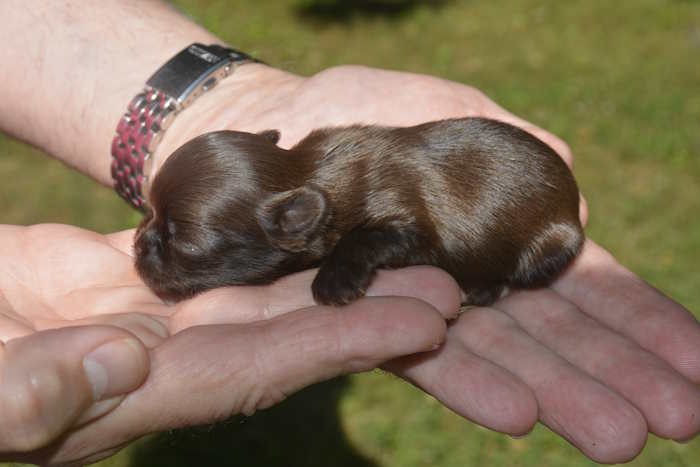 One week old Shih Tzu Puppy
One week old Shih Tzu PuppyThis breed does not shed in the usual sense of the word. They do shed, but much of the hair that is shed is caught in the existing coat and does not land on the floor or your furniture, though it is possible that you may have to vacuum some hair occasionally.
This so-called “shedding” occurs year-round, and to keep the coat beautiful, frequent brushing and combing will remove all these loose hairs. Think about it as if it is your own hair. When you brush your hair, some hairs are caught in the brush. This is exactly what happens to the Shih Tzu.
Difference Between Normal and Abnormal Hair Loss
Normal hair loss in Shih Tzus occurs subtly and gradually, following a growth cycle like human hair. Since they lose hair throughout the year, it’s not easy to notice.
However, abnormal hair loss in Shih Tzus, also called alopecia is more conspicuous and unbalanced, often resulting in visible bald spots or thinning areas in the coat.
Moreover, it can be coupled with other symptoms such as itching, redness, inflammation, changes in skin color, or behavioral changes in your dog. Such abnormal hair loss could signify underlying health issues that need immediate veterinarian attention.
What Causes Shih Tzu Hair Loss?
There are many reasons why a Shih Tzu might experience loss or thinning hair. Determining what is causing your dog's problem may be a bit of a detective job. Hair loss occurs due to external and internal factors. I will discuss each one, but it is your job, with the help of your veterinarian, to weed out the ones that are not factors.
External Factors Causing Hair Loss
External factors can significantly contribute to hair loss in Shih Tzus.
1. Fleas and ticks:
These parasites can cause severe itching and discomfort for your dog, leading to excessive scratching and, eventually, hair loss. The presence of these parasites might also lead to various skin infections, further accelerating hair loss. But fleas and ticks are not the only culprits. Pet Md lists other external parasites as also being a potential cause: mosquitoes, mange mites such as Demodex or Sarcoptes, spider bites, or insect strings.
2. Allergies:
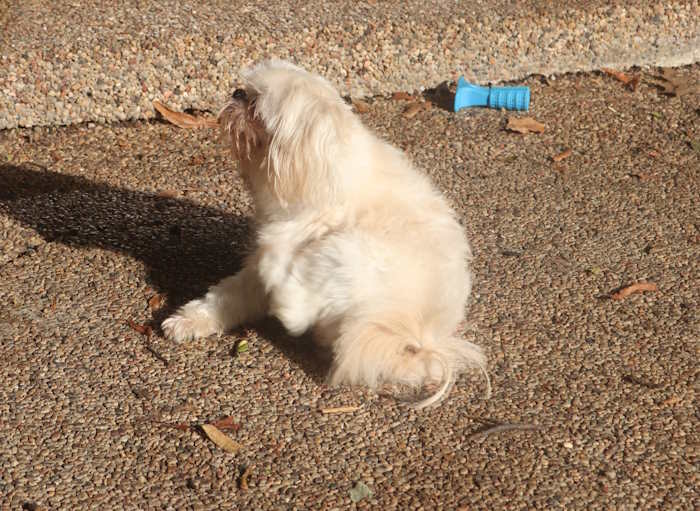 Itchy Shih Tzu dogs may be suffering from allergies.
Itchy Shih Tzu dogs may be suffering from allergies.Shih Tzus might be allergic to certain food ingredients, materials like specific fibers or plastics, or environmental elements such as pollen, dust mites, or mold spores. These allergies can result in atopic dermatitis, a skin condition that may cause inflammation, itching, and hair loss. In my opinion, trying to determine the actual allergen causing the problem is very challenging.
According to Palos Animal Hospital, symptoms to look for include excessive scratching, excessive biting, hair loss, sneezing, irritated eyes, eye discharge, or runny nose.
Food allergies can also cause itching. Veterinary Skin & Ear reports that across all dog breeds, Food allergies break down as follows.
- Beef (34% of dogs with food allergies)
- Dairy (17% of dogs with food allergies)
- Chicken (15% of dogs with food allergies)
- Wheat (13% of dogs with food allergies)
- Lamb (5% of dogs with food allergies)
- Less common allergens include soy, corn, egg, pork, fish, and rice.
If you suspect a food allergy, consult your veterinarian about doing a food elimination study.
Just as an aside, my puppy buyers who have experienced allergies to food report back to me that chicken is the usual culprit in their Shih Tzu. This could be due to the fact that many puppy foods do contain chicken as their number one protein source.
3. Poor Grooming:
Regular and proper grooming is essential for maintaining the health of a Shih Tzu's coat. Neglecting this can lead to matting and tangling of hair, which, when left unattended, can cause hair breakage and unnecessary hair loss.
Moreover, Shih Tzus are susceptible to various skin infections that can result from uncleanliness, contributing further to hair loss. If you suspect grooming might be a problem, get your dog groomed by a professional groomer and then create a plan to keep up with baths, brushing, and combing.
If your dog is matted, removing the mats will make your dog more comfortable. If you suspect that the fragrant shampoo you love might be causing problems, switch to a mild, shampoo. Suspect the shampoo, if the itching increases after you groom.
4. Exposure to Harsh Weather Conditions:
Extreme cold, heat, or dry conditions can aggravate skin dryness and cause hair to become brittle and break easily. Prolonged exposure to such harsh conditions can lead to increased hair loss in Shih Tzus. Protective wear and the application of veterinarian-recommended skin moisturizers can be helpful in such situations. It goes without saying that this breed should never live outside or be expected to stay out for extended periods of time.
Internal Factors that Cause Hair Loss in Shih Tzu Dogs
Internal factors also play a significant role in causing hair loss in Shih Tzus:
1. Hormonal Imbalance:
Certain endocrine disorders like hypothyroidism or Cushing’s disease can result in hormonal imbalances in Shih Tzus that may cause hair loss. These conditions often require long-term medical treatment. Hypothyroidism, a condition where the body doesn't produce enough thyroid hormone, can cause hair loss, lethargy, weight gain, and other symptoms.
2. Diet and Nutrition:
Inadequate or unbalanced nutrition can affect the health of the Shih Tzu's coat, leading to hair loss. A diet lacking essential vitamins, minerals, and proteins may not supply the necessary nutrients for healthy hair growth. I have seen this happen in dogs that are fed a homemade diet that doesn’t include the extra vital vitamins and minerals.
3. Genetic Disorders:
Certain breeds, including Shih Tzu, can be predisposed to genetic conditions like alopecia, which directly causes hair loss. If hair loss appears patterned or the dog is young, it might be worthwhile considering genetic predispositions. This is rare, but it does happen. This should not be confused with a very rare condition called Prapso, where the dog is born with a short coat that does not grow.
4. Stress and Anxiety:
Psychological factors like stress and anxiety can cause a Shih Tzu to excessively lick, chew, or scratch itself, leading to hair loss. Environmental, people or routine changes can trigger such behavior. These are very sensitive dogs, and even small changes can cause stress. Remember that dogs experience stress differently, and hair loss may be one way stress manifests itself.
Recognizing these internal causes can be trickier than identifying external factors. However, regular veterinary check-ups and keen observation of your Shih Tzu's behavior and physical condition can aid in the early detection and treatment of these issues.
Where does this leave my Lucy, the hairless Shih Tzu?
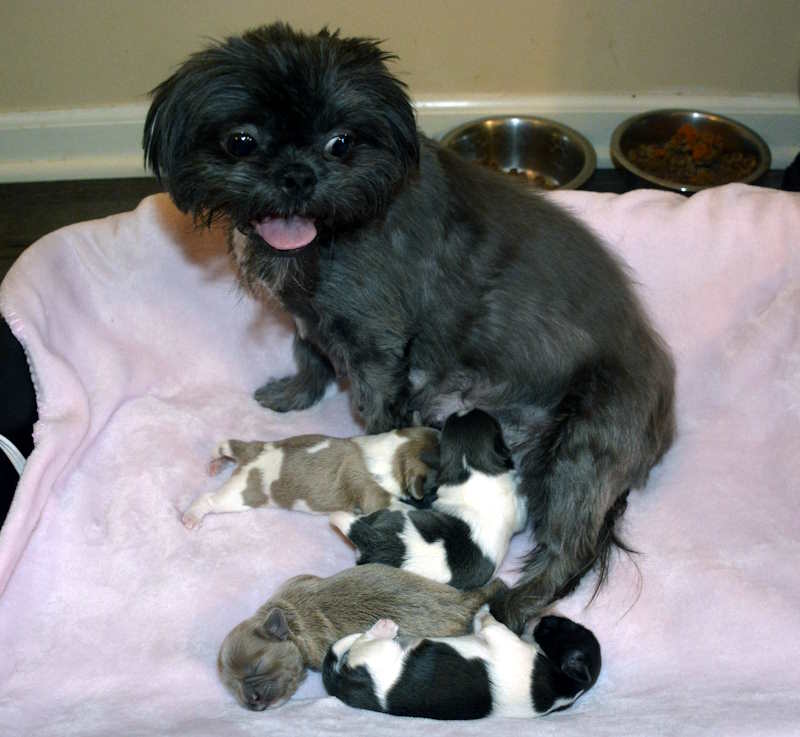 Lucy has just had her puppies and already, her hair is thinning.
Lucy has just had her puppies and already, her hair is thinning.My vet and I were working through the list of possible causes of Lucy’s hair loss when I got that proverbial “light bulb” moment. Lucy was a mom, a great mom and she put everything she had into caring for her puppies. The puppies thrived, but the stress took a toll on her body.
I was visiting with a puppy buyer who was interested in adopting one of Lucy’s puppies. As I apologized for Lucy’s poor coat, the person casually mentioned that she, too, had lost a lot of hair after her pregnancy. Could this be Lucy’s problem?
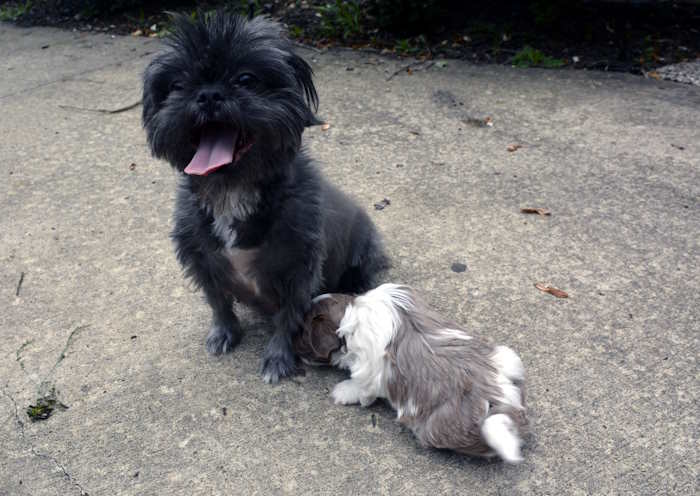 By the time the puppies have reached 5 weeks, Lucy has lost even more of her hair.
By the time the puppies have reached 5 weeks, Lucy has lost even more of her hair.Never underestimate the power of stress on hair loss. I worked with my veterinarian to rule out any medical problems using several different types of blood tests. She was checked for skin infections and mites. Skin scrapings were sent to the lab, and I tried all kinds of different shampoos, but nothing worked.
She was one of the best moms I ever had, but motherhood didn’t like her. After trying to rule out what was causing her distress, I retired her and rehomed her to a lovely couple in Cleveland. Within a few months, her hair began to grow back thicker and more luxurious than ever. Even something that she loved was causing her stress, and I was happy I was able to figure it out.
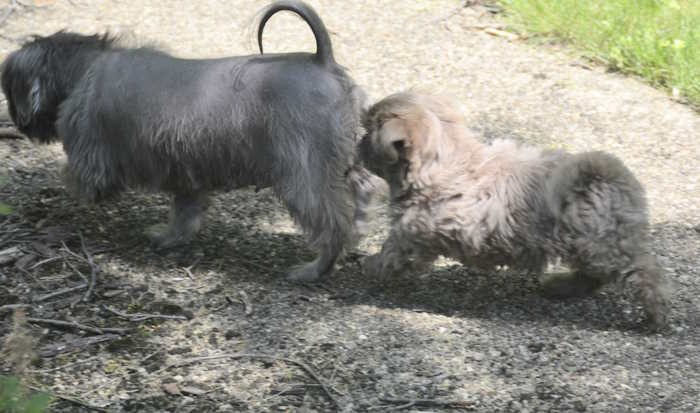
Diagnosis of Shih Tzu Hair Loss
Identifying hair loss in Shih Tzus involves careful observation of both physical and behavioral symptoms. You don’t need to be a veterinarian to see patches of thinning hair or even bald spots appearing anywhere on your body.
You might witness hair falling out more than usual during grooming or petting. Also, look out for any skin issues such as redness, inflammation, sores, or changes in skin color. Changes in the texture of their coat, such as becoming dry or brittle, could be another indication.
Behaviorally, if your Shih Tzu is experiencing excessive hair loss, they might show signs of discomfort such as persistent scratching, licking, or biting at certain areas. Some will roll around on a carpet or rub next to a surface to get relief.
They might also display signs of restlessness, difficulty sleeping, or changes in their eating habits. Noticing these symptoms early and seeking veterinary care can greatly improve your dog's comfort and health outcome.
What to Expect When You Visit Your Vet
Your vet will likely take an extensive history and ask you a number of questions:
- Changes to food or diet?
- Any other changes in the environment? Changes to laundry detergent, rug shampoo, outside activities?
- Any other behavioral signs you have observed?
- How long as the symptoms persisted?
Next, expect a thoroughly examination of the skin, ears, mouth, etc. Your vet may also order blood tests, if warranted.
Treatment Options for Hair Loss in Shih Tzu
Depending on what your veterinarian determines, treatments are available to treat the symptoms and underlying causes.
A. Medical treatments: If the hair loss is due to parasites, allergies, or bacterial infections, your veterinarian will likely prescribe topical ointments, creams, or medicated shampoos to get rid of the problem. Antifungal or antibacterial medications can help resolve skin infections that might be causing hair loss. In conditions like hypothyroidism, long-term hormone therapy may be recommended.
B. Surgical Treatments: While surgery is not a common treatment for hair loss, it may be required in some cases. For instance, if a large tumor or cyst is found on the skin that's causing hair loss, removal might be necessary. Similarly, if excessive hair licking leads to the formation of lick granulomas, surgical intervention might be considered.
C. Diet and Nutrition Plan: A well-balanced diet rich in essential vitamins, minerals, and protein can significantly influence hair health. Specifically, Omega-3 and Omega-6 fatty acids are known to improve skin and hair health, so a diet rich in these nutrients might be recommended. Additionally, a specialized diet might be necessary if the hair loss is due to a food allergy. Your vet can guide you on the best diet plan for your Shih Tzu based on their specific needs.
Remember, it is essential to consult your veterinarian for an accurate diagnosis before starting any treatment for hair loss in your Shih Tzu. Prompt and appropriate treatment can ensure your furry friend's speedy recovery and a fast return to their fluffy self.
Preventive Measures for Shih Tzu Hair Loss
Taking a proactive approach is the best way to avoid hair loss. How do you do this?
- Regular grooming and cleanliness
- Best nutrition you can afford.
- Yearly veterinary check-ups, recommended vaccinations, and medical tests such as heartworm and fecal exams. Regular dental exams
- Keep stress to a manageable level. If you are stressed, your Shih Tzu is likely to be stressed, too. Remember that even good stress can be stressful as was the case for my Lucy.
- Always provide clean fresh water.
- Protect your dog from external parasites.
- Protect your dog from the weather extremes.
- Provide adequate exercise and challenging activities.
- Do not expect your Shih Tzu dog to stay home alone for long periods of time for the sake of his mental health.
Wrap Up
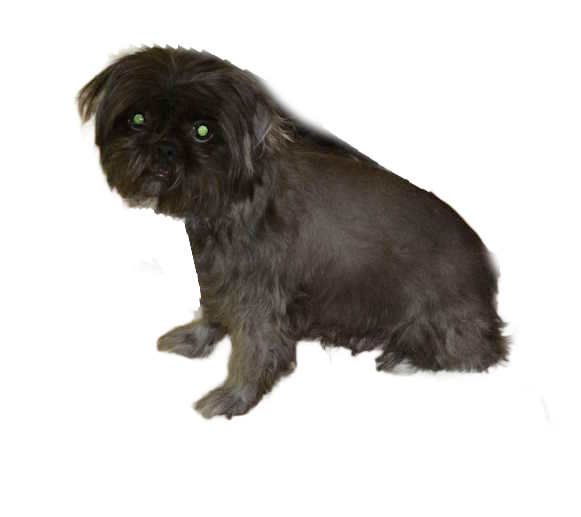
Understanding and addressing Shih Tzu hair loss requires knowledge, vigilance, and timely action. Both external and internal factors can influence your dog's hair health.
While some amount of shedding is normal, noticeable hair loss often indicates underlying health issues that need immediate attention.
Timely identification of symptoms, professional diagnosis, and effective treatment are integral in managing hair loss. By balancing the crucial aspects of preventive care - appropriate grooming, nutrition, stress management, and regular vet check-ups, you can ensure your Shih Tzu's overall hair health. It's admittedly stressful to see your beloved pet lose their signature lush coat, but remember, with early intervention and the right care, it's entirely possible to restore their coat back to its glossy glory.
Additional References and Further Reading
Merek Manual: Hair Loss (Alopecia) in Dogs
The information provided on this site is for informational purposes only and is not meant to substitute for veterinary care. Always consult your vet if you suspect your Shih Tzu is having a problem.
Shih Tzu Hair Loss: Pin for Future Reference
"Hi, I'm Janice Jones, a former veterinary technician and Shih Tzu expert with over 40 years of experience with the breed. Through Miracle Shih Tzu, I combine my medical background and extensive breed knowledge to provide reliable, practical advice for Shih Tzu owners. My mission is to help you give your Shih Tzu the happiest, healthiest life possible through evidence-based information and real-world solutions. Whether you're new to the breed or a seasoned owner, you'll find trusted guidance here for all aspects of Shih Tzu care.
I hold an undergraduate degree in Psychology with a minor in biology, Early Childhood Education, and Nursing, and a Master's in Mental Health Counseling.
